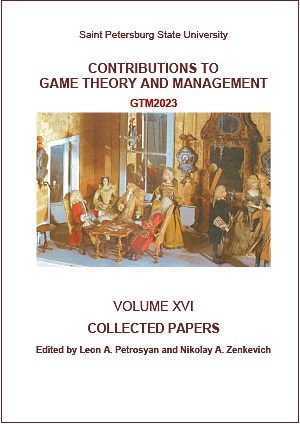Learning of Supply Chain Cost-Revenue Sharing Contract in the Form of Trade-off Mechanism in Pollution Control Problem
Abstract
A comprehensive comparison between supply chain cost-revenue sharing contract and trade-off mechanism is considered. Either of the two main members – manufacturer and retailers in the supply chain acts as the bellwether to initiate the green transition program through a cost-revenue sharing contract. While the trade-off mechanism which is applied in the pollution control problem is inspired by the sharing setting behind the contract, i.e., the player transfers part of her profit to another player in trade for her limited responsibility in reducing pollution. However, the power structure is not included in the trade-off mechanism where a third party should be designated to implement the details. The conclusion is given in the end.
Keywords:
supply chain, trade-off mechanism, pollution control, differential game
Downloads
References
Chopra, S. and P. Meindl (2013). Supply Chain Management: Strategy, Planning, and Operation. Pearson Education: New Jersey.
De Giovanni, P. and G. Zaccour (2013). Cost-Revenue Sharing in a Closed-Loop Supply Chain. Cardaliaguet, P., Cressman, R. (eds) Advances in Dynamic Games. Annals of the International Society of Dynamic Games, Birkäuser. 12, 395–421.
De Giovanni, P. and G. Zaccour (2022). A selective survey of game-theoretic models of closed-loop supply chains. Annals of Operations Research, 314(1), 77–116.
Fanokoa, P.S., I. Telahigue, G. Zaccour (2010). Buying cooperation in an asymmetric environmental differential game. Journal of Economic Dynamics and Control, 35(6), 935–946.
Ghosh, S.K., M. R. Seikh and M. Chakrabortty (2020). Analyzing a stochastic dual-channel supply chain under consumers' low carbon preferences and cap-and-trade regulation. Comput. Ind. Eng, 149.
Herrmann, F. F., A. P. Barbosa-Povoa, M. A. Butturi, S. Marinelli and M. A. Sellitto (2021) Green Supply Chain Management: Conceptual Framework and Models for Analysis. Sustainability, 13(15), 8127.
Ji, J., Z. Zhang and L. Yang (2017). Carbon emission reduction decisions in the retail-/dual-channel supply chain with consumers' preference. Journal of Cleaner Production, 141, 852–867.
Kuchesfehani, E. K., E. M. Parilina and G. Zaccour (2022). Revenue and cost sharing contract in a dynamic closed-loop supply chain with uncertain parameters. Ann Oper Res, 322, 851–877.
Li, C., J. Gao, J. Guo and J. Wang (2022). Low-Carbon Supply Chain Decisions Considering Carbon Emissions Right Pledge Financing in Different Power Structures. Energies, 15, 5721.
Masoudi, N., G. Zaccour (2013). A differential game of international pollution control with evolving environmental costs. Environment and Development Economics, 18(6), 680–700.
Su, S., E. M. Parilina (2023). Trade-Off Mechanism to Sustain Cooperation in Pollution Reduction. Khachay, M., Kochetov, Y., Eremeev, A., Khamisov, O., Mazalov, V., Pardalos, P. (eds) Mathematical Optimization Theory and Operations Research, 13930.
Wang, L., T. Xu and L. Qin (2019). A Study on Supply Chain Emission Reduction Level Based on Carbon Tax and Consumers' Low-Carbon Preferences under Stochastic Demand. Mathematical Problems in Engineering, 2019, 1621395.
Wu, H., Y. Sun, Y. Su, M. Chen, H. Zhao and Q. Li (2022). Which is the Best Supply Chain Policy: Carbon Tax, or a Low-Carbon Subsidy?. Sustainability, 14, 6312.
Ye, T., Z. Guan, J. Tao, Y. Qu (2017). Dynamic optimization and coordination about joint emission reduction in a supply chain considering consumer preference to low carbon and reference low-carbon level effect. Chin. J. Manag. Sci, 25, 52–61.
Zhang, G., X. Zhang, H. Sun and X. Zhao (2021). Three-Echelon Closed-Loop Supply Chain Network Equilibrium under Cap-and-Trade Regulation. Sustainability, 13(11), 6472.
Zhao, R., G. Neighbour, J. Han, M. McGuire and P. Deutz (2012). Using game theory to describe strategy selection for environmental risk and carbon emissions reduction in the green supply chain. Journal of Loss Prevention in the Process Industries, 25(6), 927–936.
Zhu, Q. and Y. Dou (2011). A game model for green supply chain management based on government subsidies. J. Manag. Sci. China, 14, 86–95.
Downloads
Published
How to Cite
Issue
Section
License
Articles of "Contributions to Game Theory and Management" are open access distributed under the terms of the License Agreement with Saint Petersburg State University, which permits to the authors unrestricted distribution and self-archiving free of charge.




